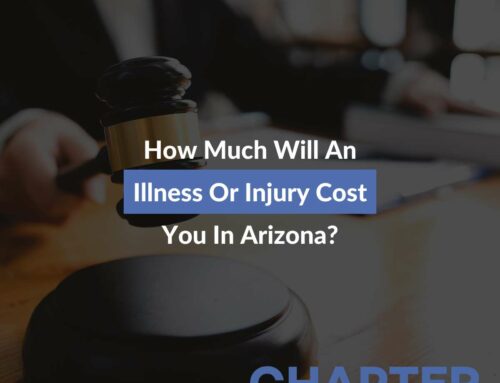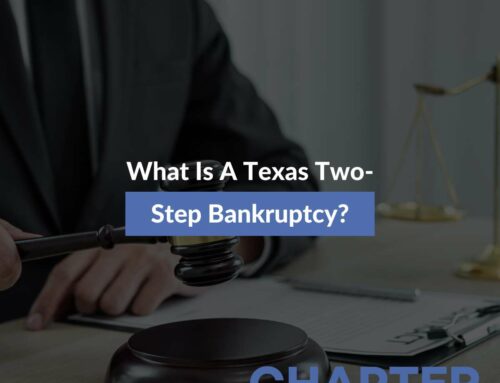Can One Spouse File Bankruptcy Without Affecting The Other Partner?
You may have taken vows ‘til death do your part with your part with your spouse, but that doesn’t necessarily mean you have to file bankruptcy together. Arizona is a community property state. That means that everything acquired during a marriage- both assets and debts- will be split equally if the spouses ever divorce. Assets and debts acquired before the marriage will remain that spouse’s separate property, as well as property acquired by gift or inheritance during the marriage. In some situations, when one spouse needs to file bankruptcy, it may actually make sense for the petition to be filed individually, rather than as a joint petition.
Is it better to file bankruptcy with your spouse or filing bankruptcy without your spouse?

Income Qualification When Filing Bankruptcy in AZ
The downside of filing a single bankruptcy as a married individual is that both of your incomes will still be used for income qualification purposes, which can make it harder to qualify for Chapter 7 bankruptcy. There are two ways to qualify for Chapter 7 bankruptcy. The first is by comparing your income to the state median income for your household size. For a household of one in Arizona, the state median monthly income is $4,653.25, or $55,839.00 annually. This only increases to $5,831.25 per month or $69,975.00 annually for a household of two. That amount continues to increase incrementally for each minor child in the household. If both you and your spouse are employed, you will need to calculate your combined average income over the past 6 months. The Means Test, which deducts mandatory expenses from average monthly income to find disposable monthly income, is also harder to pass when both spouses are employed.
Protecting Marital Assets In An AZ Chapter 7 Bankruptcy
If you are filing Chapter 7 bankruptcy as a married individual in Arizona, you will need to apply exemptions to your assets. If you fail to do so, the trustee may seize these assets, sell them at auction, and use the proceeds to pay off your creditors. The asset must be worth less than the relevant exemption if owned outright, and have less equity than the exemption if financed. Assets your spouse has acquired in their own name during the marriage are still community property, and must be protected by bankruptcy exemptions. Your spouse’s separate property doesn’t need to be protected by bankruptcy exemptions.
Vehicle Exemptions and Filing Bankruptcy in Arizona
In Arizona, the exemption for motor vehicles is $6,000 for one vehicle. For a married couple, this increases to $12,000 for one vehicle or $6,000 each for two vehicles. The Arizona homestead exemption is $150,000, which doesn’t increase for a married couple. The exemption for household goods and furnishings is $6,000, which also doesn’t increase for a married couple. One of the trickier exemptions in Arizona is the bank account exemption. On the date of filing, your account must be at or below $300, which increases to $600 for a married couple. You will need to make sure your case isn’t filed on either your pay day or your spouse’s pay day.
Filing Chapter 13 Bankruptcy Without Your Spouse
Chapter 13 bankruptcy differs from Chapter 7 bankruptcy in that you actually need to have a certain amount of income to pay off at least a minimum balance in your payment plan. Your payment plan will be based on how much disposable monthly income you have available, as well as how much and the types of debt you have. Your spouse isn’t required to help you make plan payments, but their income can be used to calculate your plan payments.
Fortunately, there is a marital adjustment available for those filing Chapter 13 without their spouses. This allows you to deduct certain expenses specific to your spouse from your disposable monthly income. Examples include car loan payments and maintenance costs, entertainment subscriptions in your spouse’s name, separate property debt payments, your spouse’s medical expenses, any child support or spousal maintenance payments your spouse makes, and vacations and business trips in which the spouse filing bankruptcy didn’t participate.
Filing Chapter 13 in Arizona is already extremely risky without an attorney, but it is easy to make mistakes while applying a marital adjustment to your payment plan. Consult with an experienced bankruptcy attorney before filing a Chapter 13 bankruptcy without your spouse.
Credit Implications For Filing Bankruptcy Without a Spouse
It is true that filing bankruptcy can have a negative impact on your credit, which may be one of the reasons that your spouse doesn’t want to file bankruptcy with you. How the bankruptcy impacts your spouse will depend on the types of debts that you discharge. Because your spouse won’t be listed as a debtor on the petition, the bankruptcy itself won’t appear on your spouse’s credit report. Any separate property debts that you discharge won’t affect your spouse as well. However, your spouse will remain liable for community property debts if you file without them. Your spouse must continue to make payments on community property debts you discharge in bankruptcy, or else it will damage your spouse’s credit.
Therefore, you should also check your lending agreements for separate accounts on which your spouse is a secondary cardholder, as your spouse’s credit could be damaged by your bankruptcy filing under certain contract terms. Our Phoenix bankruptcy attorneys can assist. Call today for a free debt evaluation.
FHA Loans and Bankruptcy in Arizona
Another thing to keep in mind is that you will be disqualified from FHA loans for 2 years after filing bankruptcy. While your spouse won’t be disqualified in the same way as you, it can be harder for your spouse to qualify without you on the loan.
Your spouse can help you with rebuilding credit after bankruptcy if you file without them. Plus, if your spouse is willing to be your co-signer or guarantor, this will make it easier for you to obtain approval on applications for future lines of credit. Additionally, your spouse can also add you as an authorized user to their accounts after bankruptcy, which will increase your available credit, which will in turn increase your credit score.
Chapter Bankruptcy Lawyers In Arizona Can Assist
Filing bankruptcy without a spouse is just one of the factors that can make bankruptcy more complicated than it already is. Whether it’s Chapter 7 bankruptcy or Chapter 13 bankruptcy, it is definitely advisable to seek out the guidance of an experienced bankruptcy attorney before filing. Our attorneys have decades’ worth of bankruptcy experience, which will help you navigate an individual bankruptcy as a married person, especially when other special circumstances are added to the mix.
During your free debt evaluation, one of our Mesa bankruptcy lawyers will check your eligibility, discuss your best options, and prepare you for the bankruptcy process in general. Also, your spouse is free to join so that they can be fully informed about the bankruptcy process with you. To get started, call our AZ Bankruptcy Attorneys (480) 405-1010 or use our online form to schedule your free debt evaluation today.
Chapter Bankruptcy Lawyers
Mesa Office
3707 E Southern Ave
Mesa, AZ 85206
Phone: 480-405-1010
Email: [email protected]
Tempe Office
4500 S Lakeshore Dr #300
Tempe, AZ 85282
Phone: 480-562-6145
Email: [email protected]







